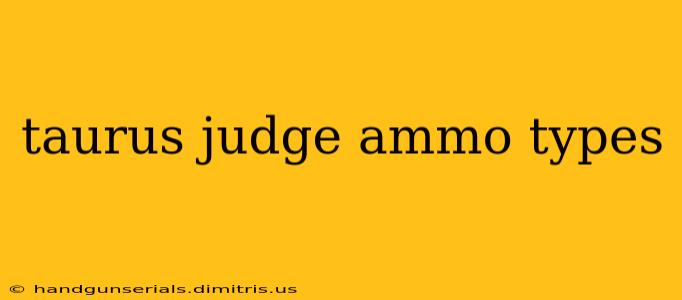The Taurus Judge revolver is a unique firearm known for its versatility in handling both .410 bore shotgun shells and .45 Colt revolver cartridges. This versatility, however, means understanding the different ammo types available is crucial for safe and effective use. This guide will delve into the various Taurus Judge ammo types, their characteristics, and considerations for responsible firearm ownership.
Understanding the Caliber Confusion: .410 vs .45 Colt
The Taurus Judge's ability to fire both .410 bore shotshells and .45 Colt cartridges is a key selling point, but it also introduces some complexity. Let's clarify the differences:
-
.410 Bore Shotshells: These are shotgun shells, typically containing multiple small shot pellets. They're effective at close range for self-defense or pest control, creating a wider spread of projectiles than a single bullet. Variations exist in shot size (e.g., #4 shot, birdshot, buckshot), significantly affecting range and stopping power. Buckshot, with larger pellets, offers greater stopping power at shorter ranges, while birdshot is better suited for smaller game.
-
.45 Colt Cartridges: These are traditional revolver cartridges, featuring a single, larger projectile. They offer greater range and penetration compared to .410 shotshells. .45 Colt ammunition comes in various loadings, including full metal jacket (FMJ), jacketed hollow point (JHP), and others, each impacting its performance and suitability for different purposes.
Types of .410 Bore Shotshells for the Taurus Judge
The .410 bore shells available for the Judge offer a variety of options:
-
Birdshot: Ideal for small game and pest control, birdshot has smaller pellets and a wider spread pattern. It offers less stopping power than buckshot but is suitable for situations where overpenetration is a concern.
-
Buckshot: Designed for self-defense, buckshot utilizes larger pellets for increased stopping power. However, buckshot's trajectory and potential for overpenetration must be carefully considered. The spread pattern is narrower than birdshot.
-
Slugs: While less common, some manufacturers offer .410 slugs, which are a single projectile providing increased accuracy and range compared to shot. This makes them potentially suitable for hunting small game at longer ranges, but it's crucial to understand the Judge's limitations in terms of accuracy with slugs.
Types of .45 Colt Cartridges for the Taurus Judge
The .45 Colt cartridge offers several load variations:
-
Full Metal Jacket (FMJ): These cartridges have a fully metal-jacketed bullet and offer good penetration but lower expansion upon impact. They are typically used for target practice and may not be ideal for self-defense due to lower stopping power compared to hollow point rounds.
-
Jacketed Hollow Point (JHP): JHP rounds expand upon impact, increasing stopping power and reducing overpenetration. These are a popular choice for self-defense applications.
-
Soft Point: These rounds offer a balance between penetration and expansion, making them a versatile option for self-defense or hunting.
-
Various Grain Weights: Both .45 Colt and .410 shotshells come in different grain weights, affecting recoil and muzzle velocity. Heavier rounds generally offer more stopping power but with increased recoil.
Choosing the Right Ammunition for Your Needs
Selecting the appropriate ammunition for your Taurus Judge depends entirely on its intended use. Consider the following:
-
Self-Defense: For self-defense, many prefer .45 Colt JHP or .410 buckshot. Understanding the limitations of both is crucial. .410 buckshot has a shorter effective range and higher chance of deflection.
-
Hunting: .45 Colt cartridges or potentially .410 slugs might be appropriate for small game hunting, but always check local hunting regulations and ensure the Judge is suitable for the intended game.
-
Target Practice: FMJ rounds are usually the most cost-effective for target practice, offering consistent performance at the range.
-
Home Defense: The short range of .410 shotshells might be useful for home defense, minimizing the risk of overpenetration. However, accuracy and effective range are significant considerations.
Disclaimer: Always consult your firearm's owner's manual for specific ammunition recommendations. Proper training and understanding of firearm safety are paramount. Improper ammunition use can lead to damage to your firearm or serious injury. This information is for educational purposes only and does not constitute professional firearms advice.

